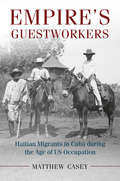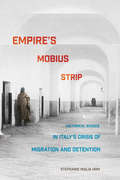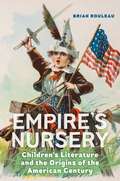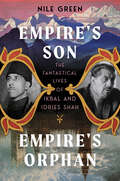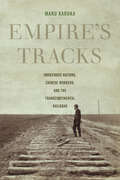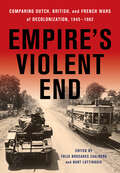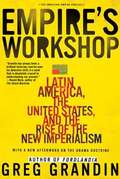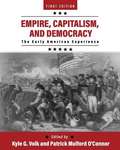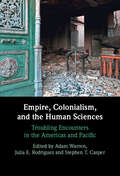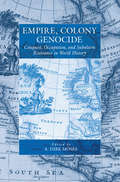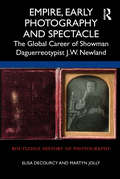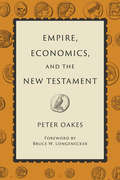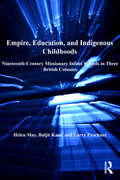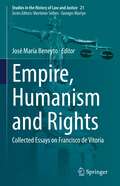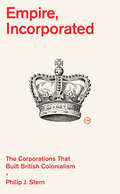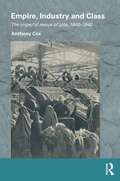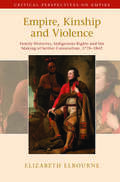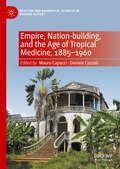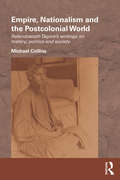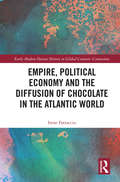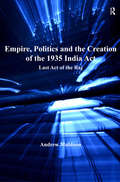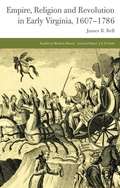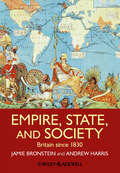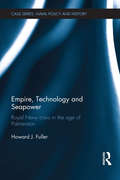- Table View
- List View
Empire's Guestworkers: Haitian Migrants in Cuba during the Age of US Occupation. (Afro-Latin America)
by Matthew CaseyInnovative study reconstructs Haitian guestworkers' lived experiences as they moved among the rural and urban areas of Haiti, and the sugar plantations, coffee farms, and cities of eastern Cuba. It offers an unprecedented glimpse into the daily workings of empire, labor, and political economy in Haiti and Cuba.
Empire's Mobius Strip: Historical Echoes in Italy's Crisis of Migration and Detention
by Stephanie Malia HomItaly's current crisis of Mediterranean migration and detention has its roots in early twentieth century imperial ambitions. Empire's Mobius Strip investigates how mobile populations were perceived to be major threats to Italian colonization, and how the state's historical mechanisms of control have resurfaced, with greater force, in today's refugee crisis.What is at stake in Empire's Mobius Strip is a deeper understanding of the forces driving those who move by choice and those who are moved. Stephanie Malia Hom focuses on Libya, considered Italy's most valuable colony, both politically and economically. Often perceived as the least of the great powers, Italian imperialism has been framed as something of "colonialism lite." But Italian colonizers carried out genocide between 1929–33, targeting nomadic Bedouin and marching almost 100,000 of them across the desert, incarcerating them in camps where more than half who entered died, simply because the Italians considered their way of life suspect. There are uncanny echoes with the situation of the Roma and migrants today. Hom explores three sites, in novella-like essays, where Italy's colonial past touches down in the present: the island, the camp, and the village.Empire's Mobius Strip brings into relief Italy's shifting constellations of mobility and empire, giving them space to surface, submerge, stretch out across time, and fold back on themselves like a Mobius strip. It deftly shows that mobility forges lasting connections between colonial imperialism and neoliberal empire, establishing Italy as a key site for the study of imperial formations in Europe and the Mediterranean.
Empire's Nursery: Children's Literature and the Origins of the American Century
by Brian RouleauHow children and children’s literature helped build America’s empireAmerica’s empire was not made by adults alone. During the nineteenth and twentieth centuries, young people became essential to its creation. Through children’s literature, authors instilled the idea of America’s power and the importance of its global prominence. As kids eagerly read dime novels, series fiction, pulp magazines, and comic books that dramatized the virtues of empire, they helped entrench a growing belief in America’s indispensability to the international order.Empires more generally require stories to justify their existence. Children’s literature seeded among young people a conviction that their country’s command of a continent (and later the world) was essential to global stability. This genre allowed ardent imperialists to obscure their aggressive agendas with a veneer of harmlessness or fun. The supposedly nonthreatening nature of the child and children’s literature thereby helped to disguise dominion’s unsavory nature.The modern era has been called both the “American Century” and the “Century of the Child.” Brian Rouleau illustrates how those conceptualizations came together by depicting children in their influential role as the junior partners of US imperial enterprise.
Empire's Son, Empire's Orphan: The Fantastical Lives of Ikbal and Idries Shah
by Nile GreenA rollicking story of two literary fabulists who revealed the West’s obsession with a fabricated, exotic East. In the highbrow literary circles of the mid-twentieth century, a father and son spread seductive accounts of a mystical Middle East. Claiming to come from Afghanistan, Ikbal and Idries Shah parlayed their assumed identities into careers full of drama and celebrity, writing dozens of books that influenced the political and cultural elite. Pitching themselves as the authentic voice of the Muslim world, they penned picaresque travelogues and exotic potboilers alongside weighty tomes on Islam and politics. Above all, father and son told Western readers what they wanted to hear: audacious yarns of eastern adventure and harmless Sufi mystics—myths that, as the century wore on and the Taliban seized power, became increasingly detached from reality. Empire’s Son, Empire’s Orphan follows the Shahs from their origins in colonial India to literary London, wartime Oxford, and counterculture California via the Levant, the League of Nations, and Latin America. Nile Green unravels the conspiracies and pseudonyms, fantastical pasts and self-aggrandizing anecdotes, high stakes and bold schemes that for nearly a century painted the defining portrait of Afghanistan. Ikbal and Idries convinced poets, spies, orientalists, diplomats, occultists, hippies, and even a prime minister that they held the key to understanding the Islamic world. From George Orwell directing Muslim propaganda to Robert Graves translating a fake manuscript of Omar Khayyam and Doris Lessing supporting jihad, Green tells the fascinating tale of how the book world was beguiled by the dream of an Afghan Shangri-La that never existed. Gambling with the currency of cultural authenticity, Ikbal and Idries became master players of the great game of empire and its aftermath. Part detective story, part intellectual folly, Empire’s Son, Empire’s Orphan reveals the divergence between representation and reality, between what we want to believe and the more complex truth.
Empire's Tracks: Indigenous Nations, Chinese Workers, and the Transcontinental Railroad (American Crossroads #52)
by Manu KarukaEmpire’s Tracks boldly reframes the history of the transcontinental railroad from the perspectives of the Cheyenne, Lakota, and Pawnee Native American tribes, and the Chinese migrants who toiled on its path. In this meticulously researched book, Manu Karuka situates the railroad within the violent global histories of colonialism and capitalism. Through an examination of legislative, military, and business records, Karuka deftly explains the imperial foundations of U.S. political economy. Tracing the shared paths of Indigenous and Asian American histories, this multisited interdisciplinary study connects military occupation to exclusionary border policies, a linked chain spanning the heart of U.S. imperialism. This highly original and beautifully wrought book unveils how the transcontinental railroad laid the tracks of the U.S. Empire.
Empire's Violent End: Comparing Dutch, British, and French Wars of Decolonization, 1945–1962
by Thijs Brocades Zaalberg Bart LuttikhuisIn Empire's Violent End, Thijs Brocades Zaalberg and Bart Luttikhuis, along with expert contributors, present comparative research focused specifically on excessive violence in Indonesia, Algeria, Vietnam, Malaysia, Kenya, and other areas during the wars of decolonization. In the last two decades, there have been heated public and scholarly debates in France, the United Kingdom, and the Netherlands on the violent end of empire. Nevertheless, the broader comparative investigations into colonial counterinsurgency tend to leave atrocities such as torture, execution, and rape in the margins. The editors describe how such comparisons mostly focus on the differences by engaging in "guilt ranking." Moreover, the dramas that have unfolded in Algeria and Kenya tend to overshadow similar violent events in Indonesia, the very first nation to declare independence directly after World War II. Empire's Violent End is the first book to place the Dutch-Indonesian case at the heart of a comparison with focused, thematic analysis on a diverse range of topics to demonstrate that despite variation in scale, combat intensity, and international dynamics, there were more similarities than differences in the ways colonial powers used extreme forms of violence. By delving into the causes and nature of the abuse, Brocades Zaalberg and Luttikhuis conclude that all cases involved some form of institutionalized impunity, which enabled the type of situation in which the forces in the service of the colonial rulers were able to use extreme violence.
Empire's Workshop: Latin America, the United States, and the Rise of the New Imperialism
by Greg GrandinIn a brilliant excavation of long-obscured history, Empire's Workshop shows how Latin America has functioned as a proving ground for American strategies and tactics overseas.
Empire, Authority, and Autonomy in Achaemenid Anatolia
by Elspeth R. M. DusinberreThe Achaemenid Persian Empire (550–330 BCE) was a vast and complex sociopolitical structure that encompassed much of modern-day Turkey, Syria, Jordan, Israel, Egypt, Iraq, Iran and Afghanistan and included two dozen distinct peoples who spoke different languages, worshipped different deities, lived in different environments and had widely differing social customs. This book offers a radical new approach to understanding the Achaemenid Persian Empire and imperialism more generally. Through a wide array of textual, visual and archaeological material, Elspeth R. M. Dusinberre shows how the rulers of the empire constructed a system flexible enough to provide for the needs of different peoples within the confines of a single imperial authority and highlights the variability in response. This book examines the dynamic tensions between authority and autonomy across the empire, providing a valuable new way of considering imperial structure and development.
Empire, Capitalism, And Democracy: The Early American Experience
by Patrick O'Connor Kyle VolkEmpire, Capitalism, and Democracy: The Early American Experience documents the history of the United States from the opening of the Atlantic World to the post-Civil War era. The primary sources included were created by women and men who lived during this time and illustrate three interdependent forces that animated the history of early America: empire, capitalism, and democracy. <p><p> Part I of the anthology explores the origins of European contact with America, "new world" civilizations, and the Atlantic slave trade. In Part II, students read sources that address American independence from British rule, early ideas of liberty and equality, the creation of the U.S. Constitution, and the first years of American government. The final part speaks to key issues that divided Americans in the nineteenth century, including market revolution, slavery, western expansion, and ideas of freedom and democracy after the Civil War. <p> With accessible introductions to each primary source and insightful questions to guide students' reading, Empire, Capitalism, and Democracy is an ideal collection for foundational courses in U.S. history.
Empire, Colonialism, and the Human Sciences: Troubling Encounters in the Americas and Pacific
by Adam Warren Julia E. Rodriguez Stephen T. CasperIn this bold reconsideration of the human sciences, an interdisciplinary team employ an expanded theoretical and geographical critical lens centering the notion of the encounter. Drawing insights from Indigenous and Latin American Studies, nine case studies delve into the dynamics of encounters between researchers, intermediaries, and research subjects in imperial and colonial contexts across the Americas and Pacific. Essays explore ethical considerations and knowledge production practices that prevailed in field and expedition science, custodial institutions, and governance debates. They reevaluate how individuals and communities subjected to research projects embraced, critiqued, or subverted them. Often, research subjects expressed their own aspirations, asserted sovereignty or autonomy, and exercised forms of power through interactions or acts of refusal. This book signals the transformative potential of Indigenous Studies and Latin American Studies for shaping future scholarship on the history of the human sciences. This title is also available as Open Access on Cambridge Core.
Empire, Colony, Genocide: Conquest, Occupation, and Subaltern Resistance in World History (War and Genocide #12)
by A. Dirk MosesIn 1944, Raphael Lemkin coined the term "genocide" to describe a foreign occupation that destroyed or permanently crippled a subject population. In this tradition, Empire, Colony, Genocide embeds genocide in the epochal geopolitical transformations of the past 500 years: the European colonization of the globe, the rise and fall of the continental land empires, violent decolonization, and the formation of nation states. It thereby challenges the customary focus on twentieth-century mass crimes and shows that genocide and "ethnic cleansing" have been intrinsic to imperial expansion. The complexity of the colonial encounter is reflected in the contrast between the insurgent identities and genocidal strategies that subaltern peoples sometimes developed to expel the occupiers, and those local elites and creole groups that the occupiers sought to co-opt. Presenting case studies on the Americas, Australia, Africa, Asia, the Ottoman Empire, Imperial Russia, and the Nazi "Third Reich," leading authorities examine the colonial dimension of the genocide concept as well as the imperial systems and discourses that enabled conquest. Empire, Colony, Genocide is a world history of genocide that highlights what Lemkin called "the role of the human group and its tribulations."
Empire, Early Photography and Spectacle: The Global Career of Showman Daguerreotypist J.W. Newland (Routledge History of Photography)
by Martyn Jolly Elisa deCourcyJames William Newland’s (1810–1857) career as a showman daguerreotypist began in the United States but expanded into Central and South America, across the Pacific to New Zealand and colonial Australia and onto India. Newland used the latest developments in photography, theatre and spectacle to create powerful new visual experiences for audiences in each of these volatile colonial societies. This book assesses his surviving, vivid portraits against other visual ephemera and archival records of his time. Newland’s magic lantern and theatre shows are imaginatively reconstructed from textual sources and analysed, with his short, rich career casting a new light on the complex worlds of the mid-nineteenth century. It provides a revealing case study of someone brokering new experiences with optical technologies for varied audiences at the forefront of the age of modern vision. This book will be of interest to scholars in art and visual culture, photography, the history of photography and Victorian history.
Empire, Economics, and the New Testament
by Peter OakesPeter Oakes has long been recognized for his illuminating use of Greco-Roman material culture and social-scientific criticism to interpret the New Testament. This volume combines his best work in a single volume and introduces a substantial new essay that challenges current scholarly approaches to paradoxical teachings of the New Testament. Of special interest to Oakes throughout this book is the concrete impact of economic realities and Roman imperialism on first-century Christian communities meeting in house churches. To address this, Oakes considers an array of textual and archaeological resources from first-century non-elite life, including extensive archaeological evidence available from Pompeii. Readers will find here a deep trove of wisdom for understanding the New Testament in the context of the Greco-Roman world.
Empire, Education, and Indigenous Childhoods: Nineteenth-Century Missionary Infant Schools in Three British Colonies (Studies in Childhood, 1700 to the Present)
by Larry Prochner Helen May Baljit KaurTaking up a little-known story of education, schooling, and missionary endeavor, Helen May, Baljit Kaur, and Larry Prochner focus on the experiences of very young ’native’ children in three British colonies. In missionary settlements across the northern part of the North Island of New Zealand, Upper Canada, and British-controlled India, experimental British ventures for placing young children of the poor in infant schools were simultaneously transported to and adopted for all three colonies. From the 1820s to the 1850s, this transplantation of Britain’s infant schools to its distant colonies was deemed a radical and enlightened tool that was meant to hasten the conversion of 'heathen' peoples by missionaries to Christianity and to European modes of civilization. The intertwined legacies of European exploration, enlightenment ideals, education, and empire building, the authors argue, provided a springboard for British colonial and missionary activity across the globe during the nineteenth century. Informed by archival research and focused on the shared as well as unique aspects of the infant schools’ colonial experience, Empire, Education, and Indigenous Childhoods illuminates both the pervasiveness of missionary education and the diverse contexts in which its attendant ideals were applied.
Empire, Humanism and Rights: Collected Essays on Francisco de Vitoria (Studies in the History of Law and Justice #21)
by José María BeneytoThis book deals with Vitoria, Charles V and Erasmus. Vitoria’s ideas had a major influence on Charles V and his European and American policy. In turn, Erasmus’ humanism was decisive in the formation of a new international order intellectually discussed by Vitoria and put into practice by the Emperor.Shedding new light on the influence of Francisco de Vitoria and Erasmus on Charles V’s imperial policy, the book’s goal is to explore the impact of Vitoria’s thought with regard to the history of, and contemporary issues in, international law, while also comparing his thinking with that of the well-known humanist Erasmus and assessing their respective influences on the imperial policy of Charles V.
Empire, Incorporated: The Corporations That Built British Colonialism
by Philip J. Stern“Brilliant, ambitious, and often surprising. A remarkable contribution to the current global debate about Empire and a small masterpiece of research and conceptual reimagining.”—William Dalrymple, author of The Anarchy: The East India Company, Corporate Violence, and the Pillage of an EmpireAn award-winning historian places the corporation—more than the Crown—at the heart of British colonialism, arguing that companies built and governed global empire, raising questions about public and private power that were just as troubling four hundred years ago as they are today.Across four centuries, from Ireland to India, the Americas to Africa and Australia, British colonialism was above all the business of corporations. Corporations conceived, promoted, financed, and governed overseas expansion, making claims over territory and peoples while ensuring that British and colonial society were invested, quite literally, in their ventures. Colonial companies were also relentlessly controversial, frequently in debt, and prone to failure. The corporation was well-suited to overseas expansion not because it was an inevitable juggernaut but because, like empire itself, it was an elusive contradiction: public and private; person and society; subordinate and autonomous; centralized and diffuse; immortal and precarious; national and cosmopolitan—a legal fiction with very real power.Breaking from traditional histories in which corporations take a supporting role by doing the dirty work of sovereign states in exchange for commercial monopolies, Philip Stern argues that corporations took the lead in global expansion and administration. Whether in sixteenth-century Ireland and North America or the Falklands in the early 1980s, corporations were key players. And, as Empire, Incorporated makes clear, venture colonialism did not cease with the end of empire. Its legacies continue to raise questions about corporate power that are just as relevant today as they were 400 years ago.Challenging conventional wisdom about where power is held on a global scale, Stern complicates the supposedly firm distinction between private enterprise and the state, offering a new history of the British Empire, as well as a new history of the corporation.
Empire, Industry and Class: The Imperial Nexus of Jute, 1840-1940 (Routledge/Edinburgh South Asian Studies Series)
by Anthony CoxPresenting a new approach towards the social history of working classes in the imperial context, this book looks at the formation of working classes in Scotland and Bengal. It analyses the trajectory of labour market formation, labour supervision, cultures of labour and class formation between two regional economies – one in an imperial country and the other in a colonial one. The book examines the everyday lives of the jute workers of the imperial nexus, and the impact of the ‘Dundee School’ of Scottish mechanics, engineers and managers who ran the Calcutta jute industry. It goes on to challenge existing theories of imperialism, class formation and class struggle – particularly those that underline the exceptional nature of the Indian experience of industrialization - and demonstrates how and why Empire was able to provide an opportunity to test and perfect ways of controlling the lower classes of Dundee. These historical debates have a continued relevance as we observe the impact of globalization and rapid industrialization in the so-called developing world and the accompanying changes in many areas of the developed world marked by de-industrialization. The book is of use to scholars of imperial history, labour history, British history and South Asian history.
Empire, Kinship and Violence: Family Histories, Indigenous Rights and the Making of Settler Colonialism, 1770-1842 (Critical Perspectives on Empire)
by Elizabeth ElbourneEmpire, Kinship and Violence traces the history of three linked imperial families in Britain and across contested colonial borderlands from 1770 to 1842. Elizabeth Elbourne tracks the Haudenosaunee Brants of northeastern North America from the American Revolution to exile in Canada; the Bannisters, a British family of colonial administrators, whistleblowers and entrepreneurs who operated across Australia, Canada and southern Africa; and the Buxtons, a family of British abolitionists who publicized information about what might now be termed genocide towards Indigenous peoples while also pioneering humanitarian colonialism. By recounting the conflicts that these interlinked families were involved in she tells a larger story about the development of British and American settler colonialism and the betrayal of Indigenous peoples. Through an analysis of the changing politics of kinship and violence, Elizabeth Elbourne sheds new light on transnational debates about issues such as Indigenous sovereignty claims, British subjecthood, violence, land rights and cultural assimilation.
Empire, Nation-building, and the Age of Tropical Medicine, 1885–1960 (Medicine and Biomedical Sciences in Modern History)
by Mauro Capocci Daniele CozzoliThis book investigates the complex relationship between the development of modern empires, nation, and the history of tropical medicine. Broadening existing historiographical perspectives, it explores imperialism outside of the British Empire, drawing on case studies from other colonial experiences in Africa, Asia, and South America in the late-nineteenth and early-twentieth century. Each of these systems adopted different approaches to colonial health and medicine. By studying their diversity, it is possible to obtain a more comprehensive picture of what we now call ‘tropical medicine.’ The authors emphasise that the British model cannot be adapted to all colonial experiences, drawing on relevant cases from both interoceanic and continental empires. The collection comprises three sections. The first examines the role of tropical medicine in the evolution and collapse of empire in countries such as Portugal and the Netherlands. The second part analyses the links between tropical medical institutions and imperial commercial and political expansion in Britain and Brazil. Finally, the authors tackle the crucial interrelated circulation of people, objects, and ideas amongst countries including Brazil, China, Italy, and Spain. Using a medical lens to analyse the inter-connected processes of nation-building and colonial expansion in the late-nineteenth and early-twentieth centuries, this book provides valuable reading for scholars of imperialism and medical history alike.
Empire, Nationalism and the Postcolonial World: Rabindranath Tagore's Writings on History, Politics and Society (Routledge/Edinburgh South Asian Studies Series)
by Michael CollinsBy presenting a new interpretation of Rabindranath Tagore’s English language writings, this book places the work of India’s greatest Nobel Prize winner and cultural icon in the context of imperial history and thereby bridges the gap between Tagore studies and imperial/postcolonial historiography. Using detailed archival research, the book charts the origins of Tagore’s ideas in Indian religious traditions and discusses the impact of early Indian nationalism on Tagore’s thinking. It offers a new interpretation of Tagore’s complex debates with Gandhi about the colonial encounter, Tagore’s provocative analysis of the impact of British imperialism in India and his questioning of nationalism as a pathway to authentic postcolonial freedom. The book also demonstrates how the man and his ideas were received and interpreted in Britain during his lifetime and how they have been sometimes misrepresented by nationalist historians and postcolonial theorists after Tagore’s death. An alternative interpretation based on an intellectual history approach, this book places Tagore’s sense of agency, his ideas and intentions within a broader historical framework. Offering an exciting critique of postcolonial theory from a historical perspective, it is a timely contribution in the wake of the 150th anniversary of Tagore's birth in 2011.
Empire, Political Economy, and the Diffusion of Chocolate in the Atlantic World (Early Modern Iberian History in Global Contexts)
by Irene FattacciuChocolate is one of the most visible examples of how a deeply exotic consumer product penetrating our daily lives fascinated Europeans during the Early Modern period. Today, over fifty percent of the four million tons of cocoa produced globally come from Sub-Saharan Africa. Ecuadorian cocoa, on the other hand, is considered premium quality. Yet the fact that Ecuadorian cocoa is preferred by today's artisanal chocolate makers is one of history’s ironic turns. During the eighteenth century, production and exports of Ecuadorian cocoa dramatically expanded due to its fast growth rate, high yield and low price, though certainly not due to its qualities of taste. This book analyzes the transition of chocolate from an exotic curiosity to an Atlantic commodity. It shows how local, inter-regional, and Atlantic markets interacted with one another and with imperial political economies. It explains how these interactions, intertwined with the resilience of local artisanal production, promoted the partial democratization of chocolate consumption as well as economic growth.
Empire, Politics and the Creation of the 1935 India Act: Last Act of the Raj
by Andrew MuldoonThe 1935 Government of India Act was arguably the most significant turning point in the history of the British administration in India. The intent of the Act, a proposal for an Indian federation, was the continuation of British control of India, and the deflection of the challenge to the Raj posed by Gandhi, Nehru and the nationalist movement. This book seeks to understand why British administrators and politicians believed that such a strategy would work and what exactly underpinned their reasons. It is argued that British efforts to defuse and disrupt the activities of Indian nationalists in the interwar years were predicated on certain cultural beliefs about Indian political behaviour and capacity. However, this was not simply a case of 'Orientalist' policy-making. Faced with a complicated political situation, a staggering amount of information and a constant need to produce analysis, the officers of the Raj imposed their own cultural expectations upon events and evidence to render them comprehensible. Indians themselves played an often overlooked role in the formulation of this political intelligence, especially the relatively few Indians who maintained close ties to the colonial government such as T.B. Sapru and M.R. Jayakar. These men were not just mediators, as they have frequently been portrayed, but were in fact important tacticians whose activities further demonstrated the weaknesses of the colonial information economy. The author employs recently released archival material, including the Indian Political Intelligence records, to situate the 1935 Act in its multiple and overlapping contexts: internal British culture and politics; the imperial 'information order' in India; and the politics of Indian nationalism. This rich and nuanced study is essential reading for scholars working on British, Indian and imperial history.
Empire, Religion and Revolution in Early Virginia, 1607�1786
by James B. BellThis book is a chronicle of England's contrasting imperial civil and ecclesiastical policies for its first two colonies, Ireland and Virginia. The settlement of Virginia contrasted sharply with England's experience in Ireland. It was not an undertaking of the state but a commercial enterprise delegated by James I to the merchant adventurers of the Virginia Company of London. The colony was launched without the familiar English civil, military, and ecclesiastical personnel and leadership applied in Ireland. It was the Company's obligation to recruit settlers for the colony, provide governance, administration, laws, and religious worship in accordance with the English Church. Ireland was not an imperial model for Virginia. The novelty of governing a sparsely settled colony thirty-seven-hundred miles distant from Whitehall in London proved financially difficult for the Virginia Company. After its charter was revoked in 1624 the province became a royal jurisdiction. Gradually over several decades the governor and legislature advocated and implemented statutes for the conduct of civil, ecclesiastical, trade, and commercial affairs. Between 1680 and 1713 London officials applied new imperial policies for the governance of overseas affairs that became the formula for the administration of the province until the Declaration of Independence.
Empire, State, and Society: Britain since 1830
by Andrew T. Harris Jamie L. BronsteinEmpire, State, and Society assesses the external and internal forces behind Britain's transformation from global superpower to its current position in the twenty-first century. The authors provide an accessible and balanced introduction, which is thoughtfully organized for ease of use for both students and teachers. Offers a crucial comparative dimension which sets the experience of Britain alongside that of twenty-first-century superpower, the United States of America Draws on recent scholarship to provide a highly current perspective Organised to allow professors to assign readings with more or less depth as student abilities and course lengths allow Written in a style that is wholly accessible and exciting for undergraduates in both the US and the UK
Empire, Technology and Seapower: Royal Navy crisis in the age of Palmerston (Cass Series: Naval Policy and History)
by Howard J. FullerThis book examines British naval diplomacy from the end of the Crimean War to the American Civil War, showing how the mid-Victorian Royal Navy suffered serious challenges during the period. Many recent works have attempted to depict the mid-Victorian Royal Navy as all-powerful, innovative, and even self-assured. In contrast, this work argues that it suffered serious challenges in the form of expanding imperial commitments, national security concerns, precarious diplomatic relations with European Powers and the United States, and technological advancements associated with the armoured warship at the height of the so-called 'Pax Britannica'. Utilising a wealth of international archival sources, this volume explores the introduction of the monitor form of ironclad during the American Civil War, which deliberately forfeited long-range power-projection for local, coastal command of the sea. It looks at the ways in which the Royal Navy responded to this new technology and uses a wealth of international primary and secondary sources to ascertain how decision-making at Whitehall affected that at Westminster. The result is a better-balanced understanding of Palmerstonian diplomacy from the end of the Crimean War to the American Civil War, the early evolution of the modern capital ship (including the catastrophic loss of the experimental sail-and-turret ironclad H.M.S. Captain), naval power-projection, and the nature of 'empire', 'technology', and 'seapower'. This book will be of great interest to all students of the Royal Navy, and of maritime and strategic studies in general.
